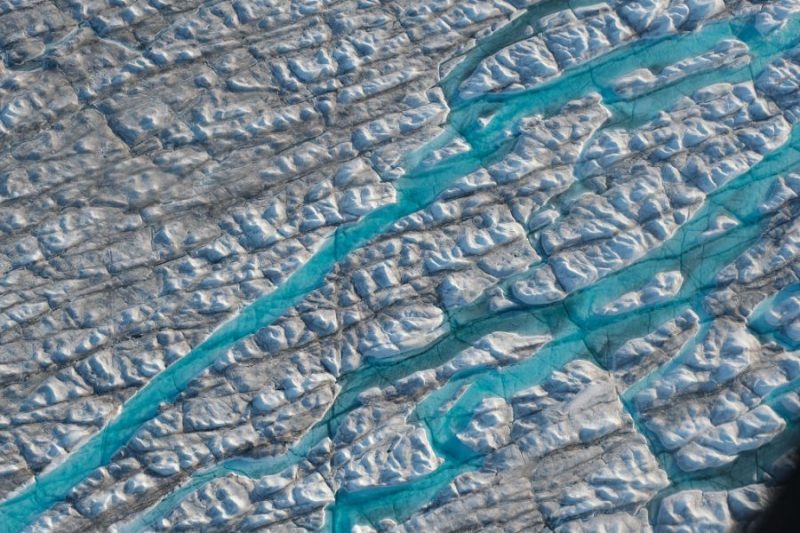The threat spectrum

Planet A
A heatwave across Greenland which raised temperatures 18° Celsius higher than average has resulted in the first recorded rain on the peak of its ice cap—more than 3,000 metres above sea level. This follows record high temperatures and a major melting event in July, making 2021 one of the worst years on record for mass melting.
Greenland’s ice is now melting at its fastest rate in 12,000 years, and that could contribute up to 33 centimetres to sea level rises by 2100.
Several climate research initiatives now focus on Greenland as an indicator of polar melting and future sea level rises. Research suggests Greenland’s ice sheet reached a climate tipping point earlier this year and is now ‘locked in’ to irreversible melting. NASA’s five-year Oceans Melting Greenland (OMG) project anticipates research on Greenland will also help anticipate the rate of melting in Antarctica, where events will have an even larger impact on sea levels and human life.
Democracy watch
Tunisia’s political crisis continues as President Kais Saied lengthens the suspension of parliament and legal immunity for MPs. That has sparked worry about the longevity of the country’s democratic constitution that was ratified following the 2011 Arab Spring protests. Citing concerns that the country was in peril, Saied shocked the world on 25 July by assuming emergency powers and removing the prime minister and cabinet.
Growing discontent with the political mismanagement of public services, the Covid-19 pandemic and the struggling economy saw thousands of demonstrators defying lockdown restrictions last month. Saied’s assumption of control has been welcomed by many Tunisians who have seen nine governments over 10 years. However, analysts warn that the country having multiple centres of power—the president, prime minister and parliament—enables political elites to exploit policy gridlocks to further their own ends.
In the wake of the Arab Spring, Tunisia provided an example of a relatively successful democratic transition in the Arab world. The undoing of Tunisian democracy could vindicate authoritarian and extremist actors and demoralise democracy advocates across Muslim-majority countries.
Information operations
On 16 August, US telecommunications company T-Mobile confirmed it had suffered a cybersecurity breach shortly after VICE News reported hackers were attempting to sell customer data online. The company has since revealed that personal data of more than 50 million past, prospective and current T-Mobile customers, including names, birth dates, social security numbers and drivers’ licence information, had been leaked in a ‘highly sophisticated cyberattack’. A major data breach of this nature leaves affected consumers vulnerable to various types of identity theft and fraud.
Last Wednesday, the United States Federal Communications Commission (FCC) announced that it had launched an investigation into the incident. This is the first high profile inquiry since President Joe Biden’s May executive order on cybersecurity which was prompted by the Colonial Pipeline hack. The findings of the FCC’s investigation, and any regulatory action against T-Mobile, may drive greater private-sector compliance with the US government’s voluntary cybersecurity guidelines.
Follow the money
On 20 August, the anniversary of Russian opposition figure Alexei Navalny’s poisoning, the US and the UK issued a joint statement announcing new sanctions on seven alleged Russian Federal Security Service (FSB) operatives believed to be directly responsible for the attack. The allies reiterated their calls for Russia to conduct a transparent investigation into Navalny’s poisoning to comply with international laws governing chemical weapons, and to respect democracy, the rule of law and human rights in the lead-up to Russia’s State Duma elections.
The sanctions follow measures imposed as part of Magnitsky-style legislation which allows for financial sanctions and travel restrictions to be placed on individuals. Australia has also agreed to implement similar legislation. While these new measures, like other sanctions on senior Kremlin officials including Alexander Bortnikov, are unlikely to change Russia’s behaviour, they demonstrate important resistance to Moscow’s abuse of human rights and chemical weapons norms by countries whose own democratic systems have been targeted by Russia.
Terror byte
Counterterrorism experts are concerned the Taliban’s sudden takeover of Afghanistan could revive Islamic militant attacks across the globe. Somalia is considered particularly vulnerable as it relies on international troops to check the growing military presence of the extremist group, al-Shabaab, in the country and across neighbouring borders.
Despite approximately 20,000 peacekeepers being deployed to protect the transitional government under the African Union Mission in Somalia (AMISOM), al-Shabaab still exploits territories with poor governance systems and uses ongoing political leadership crises to its advantage.
It’s considered likely that the Somali transitional government could fall if AMISOM troops were removed. National security advisor to the Somali president, Abdi Said Ali, rejected any comparison with the situation in Afghanistan, saying Somali troops are responsible for security in most of the country.